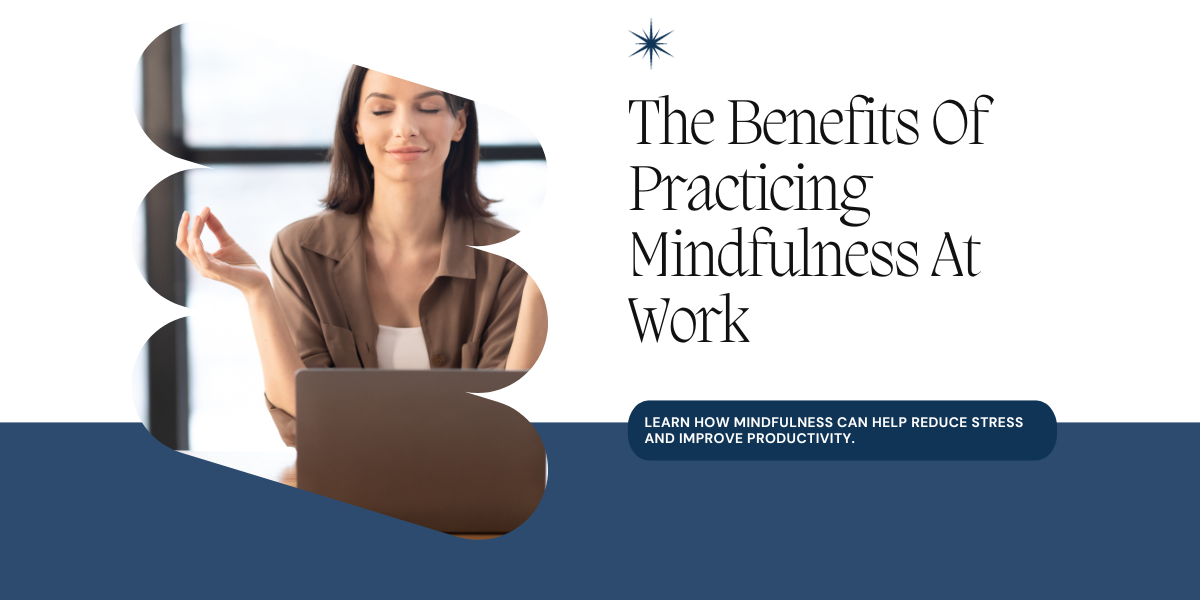The Benefits Of Practicing Mindfulness At Work

Introduction:
In today’s fast-paced and demanding work environment, employees are facing increasing levels of stress, burnout, and unhappiness. In response to this trend, many companies have turned to mindfulness as a way to promote well-being in the workplace and improve employee satisfaction. But what exactly is mindfulness, and why is it such a valuable tool for the modern workplace?
In this blog, we’ll examine the case for mindfulness in the workplace and explore its many benefits for employees, employers, and organizations as a whole.
What is Mindfulness?
Mindfulness is a mental state achieved by focusing one’s awareness on the present moment, while calmly acknowledging and accepting one’s feelings, thoughts, and bodily sensations. It’s a form of meditation that can be practiced in many different ways, including deep breathing exercises, yoga, and body scans.
Why Mindfulness Matters in the Workplace:
- Improved Mental Health: One of the most significant benefits of mindfulness is its ability to improve mental health. Regular mindfulness practice has been shown to reduce stress, anxiety, and depression, and to increase feelings of happiness, well-being, and resilience. These benefits can be especially important in the workplace, where stress levels can be high and mental health issues can go undiagnosed and untreated.
- Increased Focus and Productivity: Mindfulness can also improve focus and productivity by reducing distractions and increasing attention span. By training the brain to focus on the present moment, mindfulness can help employees stay engaged and focused, even in the face of distractions and challenges.
- Better Team Collaboration and Communication: Mindfulness can also improve team collaboration and communication by promoting empathy, emotional intelligence, and active listening. By encouraging employees to focus on their thoughts and feelings, mindfulness can help them better understand and respond to the needs of others, leading to more effective and harmonious team interactions.
- Enhanced Physical Health: In addition to its mental health benefits, mindfulness can also improve physical health by reducing stress-related physical symptoms such as headaches, fatigue, and muscle tension. By reducing stress and promoting relaxation, mindfulness can help employees maintain a healthy work-life balance and avoid burnout.
The Business Case for Mindfulness:
Improved Employee Satisfaction and Retention:
By improving mental and physical health and promoting well-being, mindfulness can also improve employee satisfaction and reduce turnover. When employees feel happy and fulfilled at work, they are more likely to be engaged and committed to their job, leading to improved job performance and increased retention.
Enhanced Employee Performance and Productivity:
Mindfulness can also improve employee performance and productivity by reducing distractions, increasing focus and engagement, and promoting a more positive work environment. When employees are less stressed and more focused, they are more likely to be productive, leading to improved performance and increased job satisfaction.
Lower Health Care Costs:
By reducing stress and improving physical health, mindfulness can also help companies reduce healthcare costs. When employees are less stressed and physically healthy, they are less likely to require medical treatment or take time off work due to illness, leading to lower healthcare costs and increased productivity.
Conclusion:
Mindfulness has many benefits for employees, employers, and organizations as a whole. By improving mental and physical health, promoting well-being, and improving employee satisfaction and performance, mindfulness can be a valuable tool for the modern workplace. Whether it’s through structured programs, meditation exercises, or simply encouraging employees to take time for self-care, companies can help employees find balance and success in their work lives.
Related Articles

Letting Go With Grace: Emotional Tools for Closure
Letting go is never easy. Whether we are parting ways with a loved one, ending a relationship, leaving a job, or saying goodbye to a cherished chapter of life, the emotional weight can feel overwhelming. Yet, closure is essential for our emotional well-being. Without it, we carry unresolved grief, anger, regret, or longing that can seep into new relationships and experiences, holding us back from healing and growth.

Breakup Blues: How to Cope and Rebuild Your Self-Worth
A breakup often feels like a silent earthquake—unseen by others but devastating within. The pain doesn’t just come from the loss of a relationship, but from the crumbling of the life, identity, and future you built with another person. You may find yourself questioning your worth, doubting your value, and feeling isolated even when surrounded by people. In Indian society, where emotional expression is often discouraged and breakups can be stigmatized, this pain may feel even more overwhelming. But the truth is—while breakups may shake you, they do not define you. You are not broken; you are in a process of emotional reformation. And with the right tools, guidance, and support system, you can rebuild not just your self-worth but also your entire life narrative.

Healing After Heartbreak: A Mental Health Perspective
Heartbreak doesn't just break your heart—it can shatter your sense of identity, peace, and purpose. Whether the end was expected or abrupt, mutual or one-sided, short-lived or long-term, the aftermath often leaves people emotionally disoriented. In Indian culture, where societal expectations and family involvement in romantic relationships are prevalent, the pain is not just personal—it is public. Yet, very few are taught how to heal from emotional loss in a healthy, sustainable way.

Boundaries in Love: Saying ‘No’ Without Guilt
Love, in its truest form, should be a safe space—a space where individuality is not only respected but celebrated. Yet, in many relationships, especially in the Indian cultural context, love is often misunderstood as constant availability, complete sacrifice, and putting the other person first, always. As noble as this may sound, this version of love often leads to emotional exhaustion, suppressed resentment, and the erosion of one’s identity.

Gaslighting in Relationships: What It Is and How to Heal
Gaslighting is a form of emotional abuse that erodes your ability to trust your own perception. It’s a slow, insidious process that often begins with subtle doubts and ends with complete self-questioning. In romantic relationships—especially in the Indian context where silence, compromise, and duty are often mistaken for love—gaslighting can be even harder to recognize.

How Depression Can Affect Your Relationship—And What You Can Do
Depression is not just an internal struggle—it ripples outward, affecting relationships, routines, and the emotional fabric that holds people together. When someone is dealing with depression, it's not only their world that becomes dim—it can cast a shadow over their most intimate connections too. In a country like India, where open conversations about mental health are still rare and love is often equated with endurance, depression within a relationship can become invisible, misunderstood, or misjudged.
